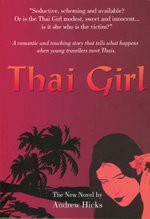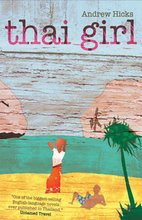
My old friend from TOT

Demolishing the satellite dish

Seeing the back of TOT

Monks at the station survey a worldly Sikoraphum
For the last two years or so a huge satellite dish has stood outside my house gazing above the coconut trees to the heavens. This was my TOT IP Star internet link and it hardly ever worked properly.
I’ve told the awful story of IP Star Wars in “MY THAI GIRL AND I” and it’s been the biggest source of stress in my marriage to Cat… except the jeep of course! (And if you’ve read the book you’ll know all about that one too!)
For me living in a small village on the rice plain of Isaan hasn’t always been easy and getting an internet connection promised to be life changing… no more driving into Sangkha to a sweaty internet cafe full of shrieking kids but instant contact with the world at the touch of a mouse.
Sadly that hasn’t been how it’s worked out though. Well, it’s been okay at times but while I’ve often been connected for hours on end, that was mainly because it was so damned slow.
Many times we went into TOT’s office in Surin to complain, which means a least two hours of driving. Nobody there admitted speaking English except a sweet accounts clerk who couldn’t answer any of my questions, so when they got tired of us, they’d then send us another fifty or so kilometres to their sub-office in Sikoraphum.
Their technicians came out to see us sometimes when we called, tweaking things to little effect and twice changing a defective box which helped quite a lot, but over time it was getting worse and worse.
In making my complaints I had to use Cat as my interpreter and battering ram which as always she just hates. This is Thailand, you see. These are important people and you can’t question the awful service they give you. You just have to shut up and pay on demand.
Anyway the internet connection got to the point that even if it was working it could hardly handle Hotmail. It was even failing to upload small images to this blog. As a result I had to take a memory stick into an internet café to post my blogs and despite having an anti-virus subscription with AVG, my computer was hacked into and I lost all my files.
So why was I paying for an expensive internet connection so bad that I had to use an internet café every few days? It was because the phone lines down the main road have all been stolen and there was no other way to get a connection.
Then a few weeks back I discovered that you can get an inexpensive monthly internet connection via mobile phone. Because of the language gap it was impossible to discover how to achieve this but eventually it got done and I’m using it now. When it works that is! Today I’ve got 24 unread messages in my Hotmail inbox and I’m writing this blog on Word instead because it crashes when I try to open them.
I have to be grateful though as having a connection that’s abysmal and cheap is better than one that’s abysmal and extortionate.
The crunch came when with almost no service for the last few months, I’d not been paying TOT’s bills. Abruptly and without written warning they cut the connection.
I tell Cat the dramatic news that the frail thread by which I’m linked to the outside world has been severed. This is not a disaster though like a chicken escaping or over-frying the insects and she remains calm and unruffled.
‘That internet’s rubbish,’ she says. ‘Better you throw it.’
‘But I’m not paying their bill,’ I say insistently.
‘You put the contract in my name so you have to pay. You not pay, I go to jail.’
There then began a long, painful exchange between us with me on my high horse and Cat just wanting to get on with her life.
‘Me pay?! For what?’ I rage. ‘For a service that’s so bad I have to drive miles to an internet café.’
‘Yes, you pay,’ Cat says calmly.
‘But when the speed was so pathetic they told me to upgrade to the expensive package. I’ve been paying for the fast speed of 512/256 but it’s still slower than the cheaper package.’
‘It’s my bill so you’ll have to pay,’ she says adamantly.
Cat takes a day off college and yet again we drive all the way to the TOT office in Surin town.
I’m damned if I’m going to pay their bill but if they’re reasonable I could compromise and pay at the lower rate. It was they who induced me to upgrade to a speed they knew they couldn’t deliver, so I’ll see them in hell before…!’
Etcetera, etcetera!
I’m determined to take a stand on this though, I tell Cat. It’s because of Thais refusing to confront such problems that the country’s in such a mess, that nothing works and nobody’s ever held accountable. Isn’t it?
She looks at me as if I’m slightly deranged.
My mouth’s dry as we open the door to TOT’s office, Cat following me reluctantly and looking tense. Unfortunately the nice English speaking clerk isn’t there so we sit down at the steel desk of my old adversary, Hatchet Face. As usual our presence hardly registers on his face.
It’d be better to put Dracula or Saddam Hussein on the customer services desk than old Hatchet Face. This man’s a nightmare. He’s huge and imposing, quite striking in a fearful sort of way and he’s dripping with gold. His one peculiarity is that he fails to make eye contact with me or with anyone else for that matter so instead I stare at the inch wide gold bracelets on his wrist.
Cat pitches in and politely puts it to him that we’d like to pay the bill at the lower rate, if we may please. At least I think she does. Then she says we want to cancel the contract too and fills in the cancellation form he gives her. Without a word, Hatchet Face phones the Sikoraphum office which he says manages our account, speaks sharply to them, waits a moment and then puts the phone down.
This is the moment of truth. My sinews are stiffened. I’ll instruct a top litigation lawyer rather than pay the higher rate for their damned TOT turtle internet.
Hatchet Face now grabs m outstanding bill I’ve brought in with me, scribbles a number on it and stabs at it with his finger.
‘You cancel, you have to pay 14,397.92 baht. Today. Now.’
I’m sure the shock registers on my face. So much?
And how can they pluck a figure out of the air just like that? I’m damned if I’ll pay the full amount and certainly not today.
‘You not pay now?’ says Hatchet Face. ‘Then you not cancel today.’ And he shoves the cancellation forms back at us across the desk, still refusing to make eye contact and staring at the computer screen over his glasses.
I’m quickly getting get the picture and it’s not very pretty. If we can’t give notice of cancellation, the two week notice period will not begin and the usual daily charge of nearly 100 baht will run on indefinitely.
This is an outrage! You’re not allowed to cancel until you’ve paid what they say you owe them?! This surely can’t be fair even in Transylvania.
I try my limited Thai on Hatchet Face none too politely, but he says there’s nothing he can do and nobody we can complain to. Accounts are dealt with in Sikoraphum and we’ll have to go to see them there.
Seething visibly, I storm out of the office, Cat staying as far behind as possible. It strikes me we’re only a whisker away from the local divorce registry which is in easy walking distance just round the next corner.
We have a disconsolate lunch in a bar run by an old German guy. It’s full of bottles of European wine and sausages that nobody ever buys and it hardly lifts our somber mood.
Cat’s very quiet and as I eat a Thai/German version of an English breakfast I contemplate the good years we’ve had together.
Even so I’m determined to stand by my principles and not be walked over by TOT despite their brick wall… and that’s my immoveable position. I just will not pay at the premium rate. They’ve been selling too many subscriptions, sharing the bandwidth until it’s as thin as rice paper and that’s unacceptable.
Then I think about my long-suffering Cat and how I made her sign my account in her own name. I savour my sausage, the first farang food I’ve had in ages and decide to stay married after all.
We’ll go to TOT in Sikoraphum right now. I’ll fall over backwards like a limp lettuce leaf and pay the bloody bill in full.
We drive silently to Sikoraphum. A pleasant old market own that prospered when the railway came through a century ago, I stop at an ATM machine and stuff my wallet. We then go into the tiny TOT office whose main job is collecting the money for peoples’ telephones.
It turns out to be a lengthy visit indeed and so very different to the unpleasant one we’ve just had. Thailand, The Land of Smiley Cock-Ups reasserts itself at its most benign.
There’s about six of them in there ranging from a little old lady down to somebody’s ten year old daughter who’s utterly intrigued by the length of my nose. Cat’s somehow managed to switch into chatty mode, though I’m sure she’s terrified I’ll explode violently, as farang often do. In the subtlest possible way she’s warned me off though, so I twiddle my thumbs silently and finger my wad of money.
From the extended dialogue they learn that I’m a Brit, much older than Cat and that I’m a retired lawyer. When they’ve asked how much my pension is and why we have no children in the intrusive way the Thais often have and when Cat has heard most of their life histories, somebody starts to think about internet bills.
By this time I’m bored to tears and I just want to get the whole thing finished and to go home. What’s money anyway? It’s just my congealed labour… the sweat of my brow, my tiredness, my grey hairs. So what he hell!
As we pass by the train station Cat suggests we should have a train ride to Si Saket some day, so she goes in and asks for the train times. As I wait for her, a train comes in almost empty of passengers. It’s ancient technology that really works and it looks good fun. I need a simple treat like a slow train ride after all this hassle.
TOT have since been quick off the mark and only took two days to come to our house and pick up their dish. The nice man who’s been to see us before asked when my next trip to England was coming up. He was civil and pleasant as always and smiled nicely for my photo. I later discovered all the bits of scrap cable and ducting he’d chucked in a heap under a bush but I wasn’t too cross as this is exactly how he’d dispose of similar rubbish in his own home.
‘No, there’s no papers to be signed,’ he said as he made his exit, so I was quite glad to have a photo record of who exactly had walked off with all this expensive kit. It’s just possible he could be an ex-employee, like the man who spent his days collecting all the telephone cables he’d put up for TOT before he went into the copper trade.
It seems I’m not the only complainant and that everyone loves to hate Telecoms of Thailand (TOT). If perhaps the company is tottering and performs poorly, that may simply be because, as they say, This Is Thailand! (TIT).
The Thai public sector for telecoms definitely needs a bomb put under it though. As I understand it, there are three state telecom organizations, TOT, CAT and TT & T, though exactly how don’t fit together I have no idea. Thaksin Shinawatra, a powerful prime minister for so many years was himself a telecoms mogul, so he had little incentive to rationalize his public competitors. He’s also accused of giving himself all the nice concessions and the IP Star satellite itself belongs to his then family company, Shin Corporation. So the problems are to be expected.
For more than a decade a merger between TOT and CAT has been proposed in order to reduce costs and business overlaps. ‘They have failed to keep pace with technological change’, says a telecoms expert, Anuparp Thilalarp. (Bangkok Post, 24 September 2008.)
So I wonder what the future will bring.
As the article in The Post says, when 3G licencing takes place everything will be wireless and TOT and CAT’s asset values will be quickly decimated… before you can say Anuparp Thilalarp.
Roll on the day... maybe then I’ll be able to get a decent internet connection!














































